Peter MALONE
Saturday, 18 September 2021 19:25
September
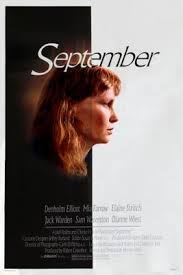
SEPTEMBER
US, 1987, 82 minutes, Colour.
Mia Farrow, Diane Wiest, Denholm Elliot, Sam Waterston, Jack Warden, Elaine Stritch, Rosemary Murphy.
Directed by Woody Allen.
September was written and directed by Woody Allen, but he does not appear. When Allen becomes more serious, critics tend to decry his films, especially Interiors and Stardust Memories. It has been the same with September.
This one is quite interior, inside the one house, and focuses on six characters, echoes of Chekhov and Ingmar Bergman, generally unhappy people, one attached another who cannot return the love: Mia Farrow, Diane Wiest, Denholm Elliott, Sam Waterston. The exceptions are the more contented older couple, Jack Warden and Elaine Stritch. Stritch steals the show with her extraordinarily extrovert dragon-like mother.
Much of the dialogue sounds pretentious to many audiences - especially if they look at the film as realism. However, Allen has written a wry, serious comedy of manners.
1. Audience response to Woody Allen films? Serious, comic? Skill with characters, situations?
2. The film as a drama of interiors: of characters, the influence of Chekhov, Ingmar Bergman? Comic touches?
3, The plausibility of the plot, the memories of Lana Turner's daughter and the murder of her mother's lover? Characters, interactions, behaviour? The credibility of the dialogue?
4. The focus on the house and the rooms, the corridors? An enclosed world? How claustrophobic?
5. The division of the screenplay into four acts, with fade-out?
6. The setting of the film in August - and September coming in some days?
7. The importance of the musical score: the credits and The Slow Boat to China, the medley of popular classics, for example, of Irving Berlin? The jazz score?
8. The focus on afternoon, night, morning, the goodbye sequence? Visualising and creating moods? Characters within the moods? Light and dark, night and day?
9. The focus on Lane: Mia Farrow's style, acting skills? The story of her relationship with her mother and father, 14 and the killing (and the question of who really held the gun?), the advice of the lawyers, her growing up influenced by the shooting? Her photography skills? Suicide attempts, affairs? Her being in Vermont at the family house to recuperate? Her house and owning it, the decision to sell? Memories of her father, of her mother's behaviour, the gangster? The attraction towards Peter, the affair? Her concern about his novel? Howard as neighbour and his attentions? Stephanie as best friend and the bonds between them? Her dowdiness, dress? Wanting to go to the film and the night spoiled by her mother? Her longing for Peter? Diane's pushing her? The selling of the house, the visitors, the embarrassment with the kissing in the cupboard? Her being hurt? The concern about Peter, his novel versus her mother's memoirs? The outburst and her telling the truth about her mother, the shooting? Her desperation? The visitors leaving, having the cup of tea with Stephanie in the kitchen, her feeling of Stephanie's betrayal, talking things out - her future?
10. Diane and Lloyd: their marriage, the taxi story? Diane and her career, strong and extrovert woman, concern about appearances, clothes, age? Vanity? Her talk to others about Lane and her life? Wanting to have a party, the dancing, her pushiness, the ouija board and the truth about her memories and relationships? Staying out late? Her reaction to the selling of the house, her rudeness to the visitors? The challenge of Lane's outburst about the shooting? Her talk, apologising for her mistakes? Her attitude of forgive and forget?
11. Lloyd and his background in physics, the Alamo, meeting Diane in the taxi, his interest in the meaning of the world, the long serious talk with Peter, supportive of Diane, her clothes and appearance, her vitality? His response to the situations and the characters?
12. Peter and his writing, memories of his father and upbringing, novel, getting over t he divorce, the summer in Vermont, writing, the affair, his tangle with Lane, falling in love with Stephanie, his advances towards her, explaining his feelings, the complications, the party, his staying the night, the relationship with Stephanie, her resistance, compliance? Music and talk? The next morning, the embrace in the cupboard and the embarrassment? The discussion with Lane about reading the wrong signals? Interested in Diane's memoirs and her vitality? A futile summer, his future?
13. Stephanie and her friendship, present in the house, the separation from her husband for the summer, concern about her children, the phone calls and her reaction? The friendship with Howard, the discussions? Peter, flirting, shock of his advances, her fears, playing the piano and the medley of
songs, the relationship with Peter, upset by the kiss, the betrayal of Lane? her reaction to the truth games and the conflict between Lane and Diane? Staying with Lane, the reconciliation?
14. Howard as pleasant neighbour, attraction towards Lane, widower, talk, coming to the party, his return, helping with the luggage? Dashed hopes? Future?
15. The close-ups on the characters, their relationships, hurts and frustrations, disappointments? Love and frustration? mood of August-September?
Published in Movie Reviews
Published in
Movie Reviews
Tagged under
Saturday, 18 September 2021 19:25
Separate Tables/ 1983

SEPARATE TABLES
UK, 1983, 112 minutes, Colour.
Alan Bates, Julie Christie, Brian Deacon, Claire Bloom, Irene Worth, Liz Smith.
Directed by John Schlesinger.
Separate Tables is a television remake of the original film of 1958 for which David Niven and Wendy Hiller won Oscars. Also in the cast were Deborah Kerr, Rita Hayworth, Burt Lancaster, Rod Taylor and Audrey Dalton. The film was directed by Delbert Mann who had won an Oscar for Marty.
This film goes back to the original plays, two plays set in the dining room of a hotel at Bournemouth in 1954-55. Unlike the original film, the leads of the two stories are played by Alan Bates and Julie Christie. They do excellent work in creating vivid characters. (Alan Bates and Julie Christie had worked together Far From The Madding Crowd, The Go-Between?, The Return of the Soldier.)
This film, faithful to Terence Rattigan's dialogue, is directed by John Schlesinger. Schlesinger is noted for a wide range of films which include Darling, Far From The Madding Crowd, Midnight Cowboy, Sunday Bloody Sunday. As well as Bates and Christie, the film has a strong cast with Claire Bloom as Miss Cooper and Irene Worth as Mrs Railton-Bell?.
The film relies on the strength of the dialogue, the strength of the characterisations, the mood of the hotel and insights into human nature through these interactions. It is a film of insight and gentle sympathy.
1. The television treatment of Terence Rattigan's plays? Memories of the 1958 film? The use of the two plays, separately? The adaptation of stage production to screen?
2. The work of Terence Rattigan, his gift for language, for creating characters, for emotional situations? British style? A British film version?
3. The use of the two plays in succession: continuity, Alan Bates and Julie Christie starring in each, comparisons and contrasts? The effect of the stars and their performances? Tour de force?
4. The hotel in Bournemouth, 1954-55? The use of only three rooms throughout the film, the mobile camera? The focus on characters, talk, manners? The evocation of radio and the early television days, of newspapers? Gentility in the provincial hotel?
5. The hotel as a microcosm: the guests, their interactions, Miss Cooper looking after them? Style?
6. Miss Cooper and the style of the hotel, her love for John, her devotion to him, wanting to help Anne, telling John the truth about Anne's visit? Her treatment of all the guests? Her sympathy for the Major, listening to his story, not being judgmental, wanting him to stay, helping him to stay? Her treatment of the guests and their conflict about the Major? Her own relationships, learning to cope - especially with the memory of John's love?
7. Table By the Window: The introduction to the guests, their-talk, small talk, the details of the meal, the staff? Anne and her glamorous style, her participation in the meal, interaction with the guests? Separate tables? The encounter with John, the revelation of the past, her marriages, her relationship with John. divorce, his imprisonment, the hurt? His drunkenness and reaction to the guests, Anne? His being hurt? His in-laws? His relationship with Miss Cooper? Anne and the phone call, the truth about her visit, John's physical attack on her? The contrast with their making the rendezvous? The next morning, the reconciliation? The intervention of Miss Cooper and her helping hand? The future of Anne and John?
8. Mrs Railton-Bell? and her aristocratic attitudes, observation? The teacher waiting for the pupil to come and visit him? Miss Meacham and her earthy remarks, her love for the races? Her Ladyship and her friendship with Mrs Railton-Bell?, yet much more sympathetic? The young couple and their initial devotion? The baby, his studying? Their working together? The maids and their waiting on the table? The demands of the maids and the kitchen?
9. Table Number 7: The introduction to the Major, his style, concerned about the papers, his being exposed, his pretences and the fraud? His friendship with Sybil? His feeling that he must leave? The discussions with Miss Cooper and the phone call? Mrs Railton-Bell? and the delegation? Miss Cooper wanting him to stay? His coming late to the meal, the interaction with Sybil and the blend of her horror and her devotion to him, her offering him the money to help him on his way? His decision to stay? The young man being friendly, the others being polite, their all gradually speaking to him, isolating Mrs Railton-Bell? The maids and their friendliness and his staying?
10. Sybil and her mother, her shyness, age, diffidence with people, fearfulness of sex? The story of her job and losing it?. Her being shocked by the news of the Major? Her devotion to him, wanting to go for a walk with him? Being made to feel she was flinging herself at him? Liking him, feeling that she was similar? The offer of the money to help? The meal, her mother's superiority, her finally defying her mother and deciding to stay at the meal? The influence of Miss Cooper and the Major?
11. The meeting, Mrs Railton-Bell? and the discovery, her haughty attitudes, controlling of the meeting, her influence and setting up the delegation, her turning her back on the Major? Her Ladyship and her hesitance, confusion, influence of Mrs Railton-Bell?, her talking to the Major? The Strattons and his defiance of Mrs Railton-Bell?, his wife's prim attitudes? His inability to study, his anger at the snobbishness? His friendliness at the table? The retired teacher and his venturing a word? Miss Meacham and her commonsense friendliness? The isolation of Mrs Railton-Bell?
12. Themes of humanity, reconciliation, self-assertion?
Published in Movie Reviews
Published in
Movie Reviews
Tagged under
Saturday, 18 September 2021 19:25
Sentimental Journey/ 1987
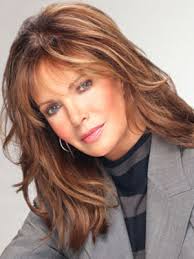
SENTIMENTAL JOURNEY
US, 1987, 94 minutes, Colour.
Jaclyn Smith, David Dukes, Cyd Charisse, Maureen Stapleton.
Directed by James Goldstone.
Sentimental Journey is a human interest telemovie. It is based loosely on the John Payne-Maureen? O'Hara film of 1946, directed by Walter Lang. This was remade by Henry Koster as The Gift of Love in the '50s with Lauren Bacall and Robert Stack. It focuses on an adopted child, the love of the parents, the death of one of the parents and their presence afterwards.
This is a vehicle for Jaclyn Smith. She is supported, well by David Dukes and by an attractive, if precocious, young girl.
The film has a New York theatrical background, is full of sentiment and warmth, is geared for the widest possible television audience. There is an enjoyable supporting performance by Maureen Stapleton.
1. The impact of this telemovie? Style? Gloss? Sentiment?
2. The film for the home audience? Adaptation of character and themes for the widest possible audience? For emotional response? Understanding?
3. The New York locations, affluent backgrounds, the theatre, performance? The musical score?
4. The title and the reference to the '40s film? The tone of the title?
5. The opening with the theatre performance, New York theatre, plays, production, rehearsals, tantrums? First night, success, reading the reviews? Award nominations? The ethos of the theatre? As a setting for the film,?
6. The portrait of Julie, her success, her relationship with Bill and his success? The desire to adopt a child? Their scenes together, love, friendship, hopes?
7. Bill, his performance, acclaim? Love for Julie? The question of children? in the park, the encounter with Libby, the talk about Camelot, its imagery? Returning Libby to the group, the visit to the orphanage, the possibility of adoption, discussions with Julie, taking Libby home?
8. Libby and her past, her mother abandoning her, the attraction towards Bill, the Camelot imagination, sharing, going home, resisting Julie, Bill and the fable about the dog and the mutual love? Growing together?
9. The sadness of Bill's death, the accident? The effect on Julie, her grief? Bill's presence to Libby? The milk and the cookie? The clashes with Julie? The discussions about Bill and his presence? Not talking? The party, the gift? Returning to the orphanage? Running away? Going back to Central Park and the castle?
10. Julie and her grief, giving up, the Tony Award nominations, opting out? Her decision to seek Libby?
11. The home sequences, Ruth and her help, the party? Alicia and her friendship, her course?
12. Ruth and the theatre world? Her friendship? Aunt? The various personalities around the theatre, interactions, rehearsals, clashes? Their treatment of Libby?
13. Relationships, love, hurt, the reality and acceptance of death?
Published in Movie Reviews
Published in
Movie Reviews
Tagged under
Saturday, 18 September 2021 19:25
Sentimental Journey/ 1946
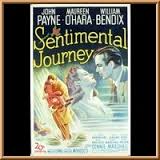
SENTIMENTAL JOURNEY
US, 1946, 94 minutes, Black and white.
Maureen O'Hara, John Payne, William Bendix, Cedric Hardwicke, Glenn Langan, Mischa Auer, Connie Marshall, Kurt Kreuger. Directed by Walter Lang.
Sentimental Journey lives tip to its title. It is a sentimental story of a New York actress, her terminal illness and death, her distraught producer husband, the little girl that they have adopted and who is to look after the husband after the actress's death.
The film stars are Maureen O'Hara and John Payne (together in To The Shores of Tripoli, Miracle on 34th. Street, Tripoli). The supporting cast includes the is the genial William Bendix and Cedric Hardwicke as a doctor. Connie Marshall little girl. The film was directed by Walter Lang, direct or of many musicals at 20th Century Fox in the early '40s and director of such films as Call Me Madam, There's No Business Like Show Business, Desk Set, Can Can.
The film was remade in the mid-'50s as The Gift of Love with Lauren Bacall and Robert Stack as well as made into a telemovie with Jaclyn Smith and David Dukes.
1. Sentimental human story? Emotional appeal?
2. Black and white photography, musical score, the theme?
3. The credibility of the plot - characters, interactions, the sentimental ghost story?
4. The portrait of Julie: the opening, with her husband, audiences misjudging the rehearsal, her love for Bill, her skill in acting, her guests, reputation, the collapse? The doctor and the truth? Bill and her love for him, the play and the rehearsals? The walk along the beach? Meeting Hitty? The interaction, the desire for adopting a daughter? The talks with Bill, the visit to the orphanage, the adopting, the test situation, the outing, the zoo, loving Hitty, thinking that she would have to let her go? The dilemma of her love for Hitty and her love for Bill? Her dying, asking Hitty to look after Bill? Appearing to her after her death?
5. Bill, his Broadway skills, devoted to his wife, busy, success, the question of adoption, the outings with Hitty, being devastated at Julie's death, the grief in the cemetery, with Donnelly, the recluse, the clashes with Hitty, wanting to send her to school, the outing and his friends, the music, the outburst? Donnelly and his attempts to help? Finally accepting Julie's death and accepting Hitty?
6. Hitty as orphan, on the beach, her fantasy and the Lady of Shallot, the meeting with Julie, the interviews, her using her imagination, with Julie, the outings, the unicorn, Uncle Donnelly and his gifts, the clashes with Bill, the grief at Julie's death, the mission to look after Bill, the quest, the guests, Julie's complaint about going away to school, the dinner with billing to her, the reconciliation?
7. Donnelly, friendly type, his advice, the gifts for Hitty, sharing in the grief, at the cemetery, the party with the friends?
8. The background of the theatre, theatrical friends?
9. The orphanage, the children, the governess, Martha and her help?
11. The wedding, going to the airport to Larry, the meeting in the restaurant, Larry's children imagining their parents? The wedding, the sense of joy, Larry's parents and brother, the ordinariness of the family support, the speeches? Sidney's glowing toast to marriage?
12. The new home, settling in, Larry and Beth and their love, the memories of Peter? The rooms and unpacking? Cathy carried? Peter and his playing the cello? The photo of his father? Yet the growing trust in Larry?
13. The importance of Beth going to Russia, her photography (and seeing her portfolio earlier)? Doing something for herself? Larry and his managing? The agent arriving and Peter's resentment? Peter going to the cemetery, coming home late? Cathy and her anger with him? The make-up, the shoplifting and Larry having to rescue? His trying to cope, not telling Beth?
14. Beth's phone call and reassurance? Her return, Larry's outburst at the airport, and then starting again?
15. The mother-in-law and her illness, Jo wanting him to go? His joy at seeing his children, sharing with them? The bonds with Jo, the memories? The important talk with his mother-in-law, the friendship, her dying? The scattering of her ashes over the water? The final night, the possibility of reuniting with Jo? The audience not sure?
16. The sketch of the mother-in-law, her strength, her ambitions for her daughter, probably aiming too high and spoiling her daughter? The pathos of her death?
17. Larry's return, the tension with Beth, the argument? The lovemaking and the children coming home and calling the police? Talking things through? Resolution?
18. The decision to move to the new house, the leaving, Pete putting the inscription in the house? The bonds to start a new life? A future?
19.. The realistic or unrealistic treatment of characters and themes? The style of film for involving audiences and their understanding of characters? Situations?
Published in Movie Reviews
Published in
Movie Reviews
Tagged under
Saturday, 18 September 2021 19:25
See You in the Morning
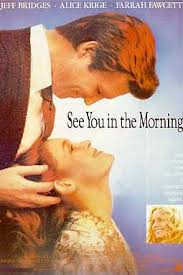
SEE YOU IN THE MORNING
US, 1989, 119 minutes, Colour.
Jeff Bridges, Farrah Fawcett, Alice Krige, Drew Barrymore, Lukas Haas, Linda Lavin, David Dukes, Macauley Culkin, Frances Sternhagen, Theodore Bikel.
Directed by Alan J. Pakula.
See you in the morning is a film about contemporary American families. It was written and directed (perhaps with an autobiographical touch) by Alan J. Pakula. From the mid-'50s to the late '60s, Pakula produced many of Robert Mulligan's fine American dramas. He began directing himself with The Sterile Cuckoo and Klute and made a number of significant films including All the President's Men and Sophie's Choice.
Jeff Bridges is effective in the central role as the husband and father who has to cope with a breaking marriage and the building of a new marriage. Farrah Fawcett is the glamour model, his first wife. English actress Alice Krige (Chariots of Fire, King David) is very good as his second wife. Drew Barrymore (E.T., Firestarter) and Lukas Haas (Witness, Solar Babies, Lady in White) are effective as the children.
The film is in the tradition of Ordinary People, Terms of Endearment - dramas blending human situations with sentiment. This kind of film is often criticised as being unreal - but it is contrived drama for the sake of communicating characters and message. It borders on the soap opera - but has greater strength.
1. The impact of this film and its observations about marriage and family? in America? Universal appeal?
2. New York City, the New England countryside? Authentic, real or not? The musical score and the use of songs: Nat 'King' Cole and 'When I Fall in Love,' 'Our Love is Here to Stay?'
3. The title, Larry's use of the song? Application to the Livingston family, to the Goodwins?
4. The structure of the film: the initial introduction to the two families, the portrait of the marriage, the insertion of the flashbacks? The development of the crises and Larry's having to cope?
5. The initial portrait of the Livingstons: at the waterfall, the bottles, playing together, grandmother and her strength, the bond within the family, the social, Jo wanting to break the marriage?
6. The Goodwins: Peter and his accomplishment as a pianist, the paralysis, his stopping in mid-performance, the children, Beth and her love and support, the walk-off? The off-screen suicide and its consequences?
7. The meeting between Larry and Beth? Sidney being the intermediary? The party, taking photographs? The mutual embarrassment? The pair both having migraines? Walking home? Meeting one year later, the hospital cafe, the rain? The growing bond between the two?
8. Sidney and Martin as intermediaries? The initial party, married for 20 years, the glow in Sidney's life, her children and their multicultural backgrounds? Sidney and Beth and their friendship? Sidney telling Beth the truth at the concert about the marriage, Martin's failure, the inability to have children, affair, reconciliation?
9. Larry and his self-assessment, the break-up of the marriage, Jo walking out and back to her career? The special bond with his mother-in-law and their easy talking together? His work and his skill as a psychiatrist? His telling jokes? Meeting Beth, the migraine, walking home? Meeting her one year later? Falling in love? Her rejection, his dressing up as Cupid and the proposal? her overhearing him with the patient on the phone? The bond between the two and the preparation for marriage?
10. Beth her sense of responsibility. sense of guilt, relying on Cathy, love for her children, the memories? Going to Larry's psychologist friend for some help to understand?
Published in Movie Reviews
Published in
Movie Reviews
Tagged under
Saturday, 18 September 2021 19:25
Seduced
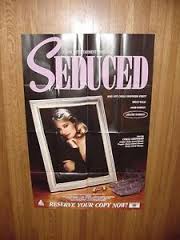
SEDUCED
US, 1985, 100 minutes, Colour.
Cybill Shepherd, Gregory Harrison, Jose Ferrer, Mel Ferrer, Ray Wise, Adrienne Barbeau, Michael C. Gynne, Jordan Christopher.
Directed by Jerrold Freedman.
Seduced is a glossy melodrama, a star vehicle for Gregory Harrison (Trapper John) and Cybill Shepherd (Moonlighting). There is a strong supporting guest role cast including Jose Ferrer and Mel Ferrer. The film is familiar material: a charming D.A., big business corporations, murder, glamour and affluence, seduction. It is an '80s variation on the Double Indemnity story, - but opts for glamour rather than for dramatic tension and character study. Direction is by Jerrold Freedman, a director of many mini-series and telemovies.
1. Interesting and entertaining telemovie? The world of the glamorous bestseller?
2. Telemovie style: the American city, affluence, the Caribbean, the world of gangsters? Musical score?
3. The Double Indemnity tradition in American.~-crime melodramas? The male victim? The female shrewd seducer? The predictability of the plot? 1980s gloss? The title - Mike seduced by Vicki? At the end, vice versa?
4, Audience response to the basic situation: the big company, the mergers, money and deals, secrecy, plots, murder, wills and changed wills, seduction, the complexities of the investigation, the law, the shootouts? Enjoyable at a soap opera level?
5. Gregory Harrison and his style as Mike: success, his father, District Attorney, other people's jealousy of his position, his job, his past with, Vicki, meeting her socially, her husband's death, his being seduced, the Caribbean holiday, the pursuit and the photography? His visits to his mother? Mr Killian and his hold over him, expectations? His rival? The arrest of Randolph and the interrogation, his visit to the nightclub and his girlfriend for an alibi? The will and Barbara being disinherited? The dangers, the gangsters and his identifying them, the shoot-out, his being wounded? His position being compromised? The truth? Confronting Vicki? His seducing her and her not killing him?
6. Cybill Shepherd and her glamorous style as Vicki, her wealthy wedding, memories of the past, the death of her husband, her seducing Mike, Barbara being cut out of the will and their clashes? her plans, double-dealing, past affair, killing the gangster, setting up Mike, her not being able to shoot him at the end?
7. Arthur and his shady background, deals, playing with people, his death? His first wife and her cattiness and the will? Barbara and her anger? The complexity of rich families?
8. Killian and the good of the company, respectability?
9. The gangster and the shooting of Arthur? The set-up for Vicki to shoot him? Her affair with the photographer, his deals, the confrontation with Mike, his death?
10. Themes of wealth, passion? The law? A glossy tale of good and evil, right and wrong?
Published in Movie Reviews
Published in
Movie Reviews
Tagged under
Saturday, 18 September 2021 19:25
Secret Admirer
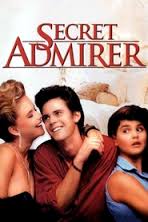
SECRET ADMIRER
US, 1985, 90 minutes, Colour.
C. Thomas Howell, Kelly Preston, Lori Loughlin, Leigh Taylor Young, Fred Ward, Cliff de Young, Dee Wallace, Casey Siemaszko, Corey Haim.
Secret Admirer is one of many youth-oriented films of the early and mid-80s. The films seem to have saturated the market - while some were very effective (the film versions of S. E. Hinton's books, Tex, Rumblefish, The Outsiders) there was a great deal of corny material, sex comedy in style after such films as Porky's and its sequels. This film attempts some humane treatment of its characters - but the plot is quite preposterous and runs into the dangers of overstatement and titillation.
The film has a great deal of acting talent before the cameras. C. Thomas Howell made an impact in The Outsiders. The leading ladies appeared in several of the youth-oriented films. The parent group is played by veterans Leigh Taylor Young, Fred Ward, Cliff de Young and Dee Wallace.
The film depends on an anonymous love letter written from heroine to hero which then is picked up by accident by most of the cast with consequent misunderstandings. The results are at times humorous, at times farcical. Needless to say, all is resolved at the end. An indication of a popular type of American film-making, of the '80s.
1. Entertaining? Far-fetched? Youth-oriented film? Making a point about youth, relationships, marriage?
2. The Californian locations, suburbia, the world of the young, of parents? Contemporary America? Musical score, songs?
3. The title and its focus, the writing of the letter under the credits the circulation of the letter, the various people picking it up - a kind of La Ronde of a love note? The consequences for all involved?
4. The focus on Michael, his life at home, family, school? His friends? The details of activities? His admiration for Debbie and trying to date her? The clashes with Steve? Friendship with Roger? Relationship to parents? His friendship with Toni, with her often, sharing experiences, taking her for granted? Her offer to write his notes to Debbie? The misunderstandings? The sexual encounter with Debbie and its failure? Toni on the side? Watching? The almost too late discovery that she wrote the notes? Chasing her to the wharf? Their being united? Typical American teenager of the '80s?
5. The girls in Michael's life - Debbie as the ideal blonde of the school? Her relationship with her parents, tantrums, being spoilt? her friendship with Steve? Her attraction towards Michael? The outings, the meals, the accidents, the failure? The sexual encounter for his birthday - and her coldness? Receiving the notes from Toni? The contrast with Toni - at home, relationship with her parents? Devotion to Michael, following him, sharing with him, being neglected? Writing the notes and pouring out her heart? The mix-ups about the note? The realisation that she was the writer of the letters? Her going on the education cruise, the farewells, the boat? Literally going overboard and being united with Michael?
6. The portrait of the parents - the long marriages, friendships, playing cards together? The notes and the misunderstandings? The musical chairs - the rendezvous at the car park where the kids went? Their seeing each other? The farcical deceptions? The scenes at home, at school? The policeman and his authority? The fears, the breaking off of the liaison? The children being hurt when they discovered their note had been used? Reconciliation? The ironic comments on the fragilities of marriage?
7. Michael, Toni and Debbie and their friends - typical teenagers, brash, American loud? The birthday party? Tough poses?
8. Adolescent themes of responsibility, growing up, relationships? A blend of humour and sentiment?
Published in Movie Reviews
Published in
Movie Reviews
Tagged under
Saturday, 18 September 2021 19:25
Scrooged
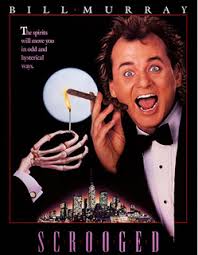
SCROOGED
US, 1988, 101 minutes, Colour.
Bill Murray, Karen Allen, Carol Kane, John Forsythe, Bob Goldthwait, John Glover, Robert Mitchum, Michael J. Pollard, David Johansen, Jamie Farr, Robert Goulet.
Directed by Richard Donner.
Scrooged is a variation on Charles Dickens' A Christmas Carol. It is set in an '80s TV network with Bill Murray playing Frank Cross, a contemporary Scrooge. He is also putting on a live performance, on Christmas Eve, of Dickens' play.
The film capitalises on Bill Murray's comic style. It is also done in American broad slapstick style, especially with the ghosts of Christmas Past, Present (a screeching Carol Kane) and Future. However, Karen Allen as the heroine, offers something of a delicate balance.
There are special effects, pleasant variations on the plot of A Christmas Carol - and, of course, a long speech of Christmas goodwill and peace for the world.
Direction is by Richard Donner (The Omen, Superman the Movie, The Goonies, Lethal Weapon).
1. The popularity of Charles Dickens' novel? the many adaptations, this American variation? Basic plot? The popularity of the theme?
2. The adaptation to the United States? to the television station, the presentation of Dickens' novel on television? Frank Cross as Ebenezer Scrooge? The modern American equivalent of Scrooge's 19th century experience?
3. New York, the television station, the journey into the Christmases past? The stars, the guest stars (and Lee Majors and the initial trailer, Robert Goulet and his singing, John Houseman and his reading)? The score, the songs, the love theme at the end?
4. The title, the mood - and television stations victimising their public?
5. Bill Murray carrying the film: his characterisation of Frank Cross, the television world, in charge, his conference, the promotion and its violence, capitalising on violence and death? His public relations? The owner of the station and his relationship with him? Clashes? The introduction of Bryce and his becoming edgy? His assistant and her son? The allotting of the Christmas gifts and his meanness? (To his brother?) His work in the studio, at lunch? Something coming over him at lunch? The ghost of his former boss and the warning, the special effects and the effect on him, ringing Claire? The arrival of the ghost of Christmas Past, seeing himself as a young boy, his mother and her support, his harsh father, the gift? The hippy Christmas, the meeting with Claire, the living together, the Karma Sutra, the work at the television station, the show and its going on, his making his option? The break with Claire? The hard work and his not partying? His superior and his instructions? His brother and the gap between them? Claire's arrival, talking things over, the visit to her refuge, the friendship with the various people there? Christmas Present and his going to his assistant's home, her son and his not speaking? His brother and the TV Trivial Pursuit game? The drifter and finding him dead? Going back to the studio and out of control? Christmas Future and his fear of the monster, a hardened Claire as a society woman taking his advice, his assistant's boy in the padded cell, the cremation and so few at his funeral?
6. The effect of the change, his glad at being alive, going to the television studio, turning the play into a party, his long speech and its Christmas and peace message? Reconciliation with his brother, Claire arriving, the boy with Tiny Tim's quote and speaking? The humour of the credits?
7. The television network and its logos, policies, PR, meetings and yes-men and women? Robert Mitchum as the boss, dinners, watching, the good cheer? Bryce and his interfering, directing? The censor and her interference, injuries? The production, Buddy Hackett and the stars? The humour of the production? John Houseman and his reading? The staff finally joining in the party?
8. Claire and her wanting to save the world, her refuge, the people and their devotion to her, her service of them? The past, the chance encounter with Frank, living together, the bonds together, decisions and his separating from her? Her return?
9. The ghosts: the taxi driver and his wisecracks, reckless driving, taking him to his past? Carol Kane as the ghost of Christmas Present and her battering him? The monster and Christmas Future? Special effects and stunts?
10. His assistant and her work, her son, family, her grief? The joy of her boy speaking?
11. A Christmas American Carol, its message for the '80s?
Published in Movie Reviews
Published in
Movie Reviews
Tagged under
Saturday, 18 September 2021 19:25
Scarlet Pimpernel, The
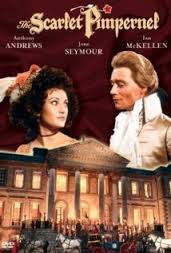
THE SCARLET PIMPERNEL
UK, 1982, 142 minutes, Colour.
Anthony Andrews, Ian McKellen?, Jane Seymour, James Villiers.
Directed by Clive Donner.
The film is based on the novel by Baroness Orczy and its companion volume El Dorado. The film was made as a successful espionage period drama with Leslie Howard, Merle Oberon and Raymond Massey in the '30s. There was a '40s version with David Niven, The Elusive Pimpernel. This television version has lavish treatment, excellent re-creation of atmosphere and interesting performances, from Anthony Andrews (Brideshead Revisited, Under the Volcano) as Sir Percy Blakeny, Shakespearian and English stage actor Ian McKellan? as Chauvelin and Jane Seymour as Marguerite. There is an interesting British supporting cast led by James Villiers.
The film has interest as a French Revolution story, reminiscent of aspects of A Tale of Two Cities. It also shows British society of the 18th century - with their lavish style. There is espionage, action, romance, misunderstanding and betrayal. While the film works as an action adventure - it is done with elegant style, directed by Clive Donner whose credits range from such films as Pinter's The Birthday Party to Alfred the Great and telemovies including versions of Dickens' A Christmas Carol and The Thief of Baghdad.
1. An entertaining period costume drama? The popularity of the novels? Previous film versions? Comparisons7
2. The production values: the French and English locations, the re-creation of Paris and London, the use of historical buildings and sites? Costumes and decor? Action sequences? Editing and pace? Musical score?
3. The title and its focus on Sir Percy Blakeny as fop and as spy? The issue of the emblem? The humorous verse about the Scarlet Pimpernel?
4. The initial impact of Sir Percy Blakeny? As a fop and a dandy? His affected manner of speaking, concentration on clothes, characters responding to him with his love of the trivial? His friendship with the French families? The humour and danger of his rescue attempts, the executions in Paris, his escaping with people in the coffins? His range of disguises (the old woman with the boy with the plague, the old carrier of furniture)? Comments on his elusiveness? His cover, mask? The encounter with Marguerite and his falling in love with her? The deception of Chauvelin? The marriage to Marguerite? The prospect of happiness? The prospect of continuing his mission? His loss of faith in Marguerite, the estrangement - as seen at home, at the social gatherings? The suspicions and watching her at the dance? The irony of his hearing the truth when she did not know whom she was speaking to? His men, their plans, bringing Armand into his team? The visit to France, the plans for rescuing the Dauphin, his disguise? Armand's failure and his-return? His capture, Chauvelin's gloating, Marguerite's visit to the prison? His engineering getting out, the visit to the chateau, his going through with the execution charade, the swordfight with Chauvelin, leaving him to Robespierre? The happy ending and reconciliation, with Marguerite? Anthony Andrews and an affected, stylish and sympathetic performance? Making the Scarlet Pimpernel credible?
5. Chauvelin and his role in the French Revolution, the executions, his love for Marguerite, her rejection of him? His loyalty to the Revolution? Dependence on Armand? The pressure on him to discover the identity of the Scarlet Pimpernel? His despising of Sir Percy? His going to England, the pressure on Marguerite about Armand? The dance, his making her discover the secret of the note, the confrontation with Sir Percy? His tricks in France, his being deceived about the Dauphin, his capture of Percy, imprisonment, his seeming victory and not keeping his word, the swordfight and his being left for French justice? A worthy opponent to the Scarlet Pimpernel?
6. Marguerite as actress, her love for Armand and concern about him, friendship with Louise? Falling in love with Sir Percy, attracted by him, the picnic (also as a cover for another rescue)? The marriage scene and the lyrical romance? England and her future, the information and challenge about the Marquis being betrayed and his family executed? The estrangement with Percy? The blackmail by Chauvelin? Her device of getting the information from Andrew, her warning the Scarlet Pimpernel, her discovery of the truth, going to France, to the temple prison, the final denouement and her grief, joy, reconciliation? An attractive heroine?
7. The Scarlet Pimpernel's band - English nobility, their covering their heroism? The rescuing of the nobles? Marriages? Armand and his role in the state, the Revolution, his relationship with Louise, the close escape, Chauvelin using Louise, his return? His decision to return to Paris to rescue Louise?
8. The picture of the Revolution - the courts, the nobles in prison, the executions? The atmosphere of the guillotine? The film's attitude towards the French Revolution?
9. Espionage, 18th century style and the Baron and his Austrian background, his protection, giving of information, insinuating doubts, participation in the final rescue of the Dauphin?
10. The perennial popularity of this kind of adventure - far-fetched, heroic, full of glamour and fine settings - larger than life and always entertaining?
Published in Movie Reviews
Published in
Movie Reviews
Tagged under
Saturday, 18 September 2021 19:25
Say One For Me
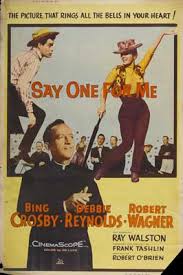
SAY ONE FOR ME
US, 1959, 117 minutes, Colour.
Bing Crosby, Robert Wagner, Debbie Reynolds, Ray Walston, Les Tremayne, Connie Gilchrist, Frank McHugh?, Joe Besser, Sebastian Cabot.
Directed by Frank Tashlin.
Say One For Me is a colourful corny religious musical. It gives Bing Crosby an opportunity to reprise his priest character, Oscar-winning in Going my Way and popular in The Bells of St Mary's. He is a pastor in a show business parish in New York. Debbie Reynolds is a pert heroine. Robert Wagner has an opportunity to sing and dance as the show business conman. There is a sympathetic performance by Ray Walston as an alcoholic song composer and accompanist. Frank McHugh?, veteran of many old films including Going My Way, is a Damon Runyon type gambler. There are also some glimpses of Stella Stevens.
The film is usually listed in the films for the Turkey Awards - it is sentimental and corny. The songs are bright but not particularly memorable. Direction is by Frank Tashlin, director of a number of Martin and Lewis and Jerry Lewis vehicles.
The film was released in 1959 and shows the Catholic church of the 50s, the place of the priest, the parish, devotions, the Mass. There are touches of change and updating -which was to happen in the ensuing years. An interesting, look at how Hollywood saw the Catholic church in those days.
1. The film as musical, comedy? Human drama?
2. Wide screen photography, colour, New York, the musical numbers, the church? The focus on television specials? The songs, music and lyrics?
3. The title, the title song, the focus on religion?
4. Bing Crosby as a priest, credible? His past roles? His parish, Masses, sermons? Helping people in need? The concerts and benefits? His friends? His fussy housekeeper? Relationship with Holly and helping her, going to the nightclub? Her father and his illness? The clashes with Tony, taking his joke, giving him jokes back? The friendship with Phil and trying to help him with his alcoholism? Sandy and the baptism of the baby? His advice, friendship, singing? A credible priest?
5. Debbie Reynolds as Holly, song and dance, studies, love for her father, his illness, her audition with Tony, warding him off, his visits to the apartment, her dancing in the nightclub, Father Conroy's visit (and her changing her name), her pleading Tony's cause, the clashes between the two, Sandy and the baptism of the baby, the build-tip to the benefit, the singing with Tony and Father Conroy?
6. Robert Wagner - and his song and dance routines, in the nightclub, tough image, sexy, pursuit of Holly, using Phil? Moods? Visit to the apartment? The performance with Holly and Father Conroy's visit? The clashes? His visit when the Monsignor was present? The argument about the jokes? His need of money, big jobs, lack of self-confidence, being godfather? Going on the benefit, giving the credit to Phil, singing With Father Conroy?
7. Phil and his skill with songs, sardonic, hiding the drink, accompanying Tony, friendship with Holly, the friendship with Father Conroy, giving up the drink, the final credit?
3. Sandy as the unmarried mother, the baby, in show business, frightened, the baptism, Tony as godfather?
9. The world of show business, New York, the nightclubs, the patrons? Gamblers and gangsters? Television shows and promotion?
10. The popular kind of musical of the '50s?
Published in Movie Reviews
Published in
Movie Reviews
Tagged under